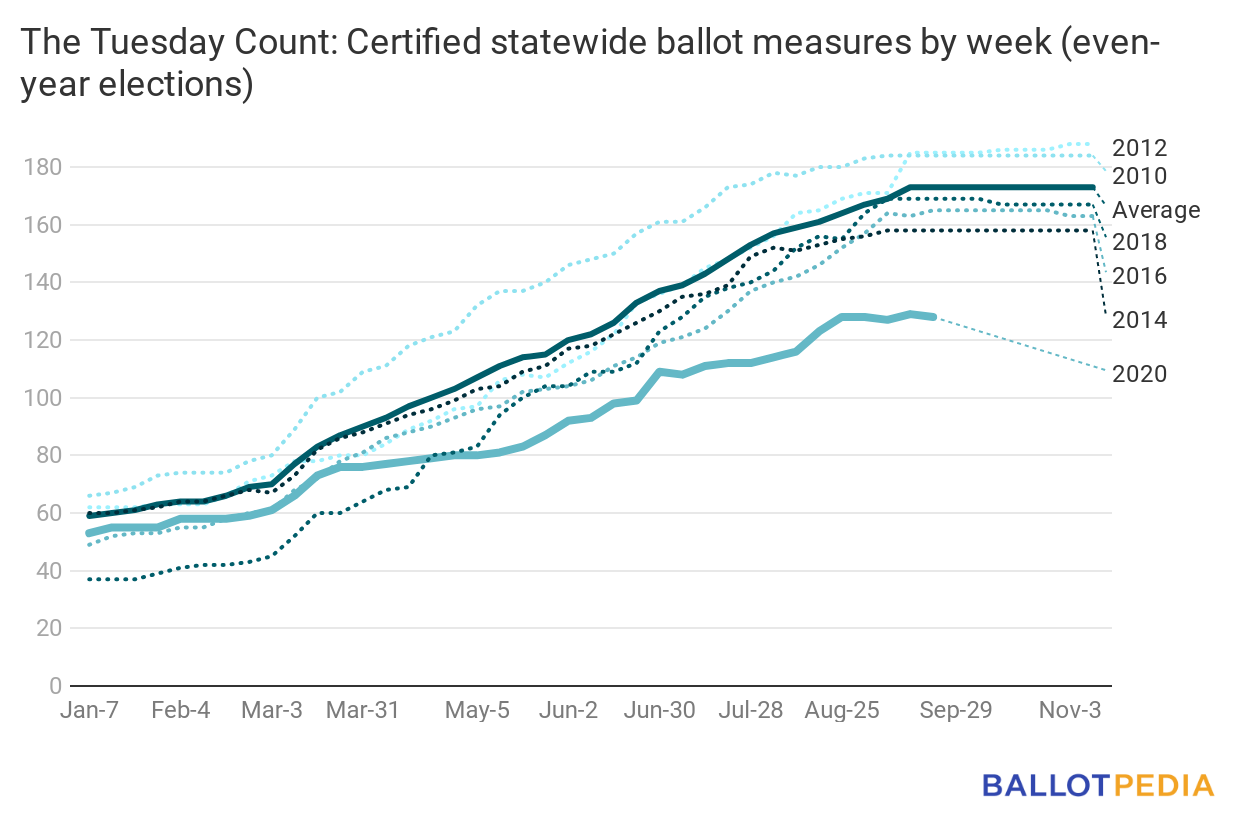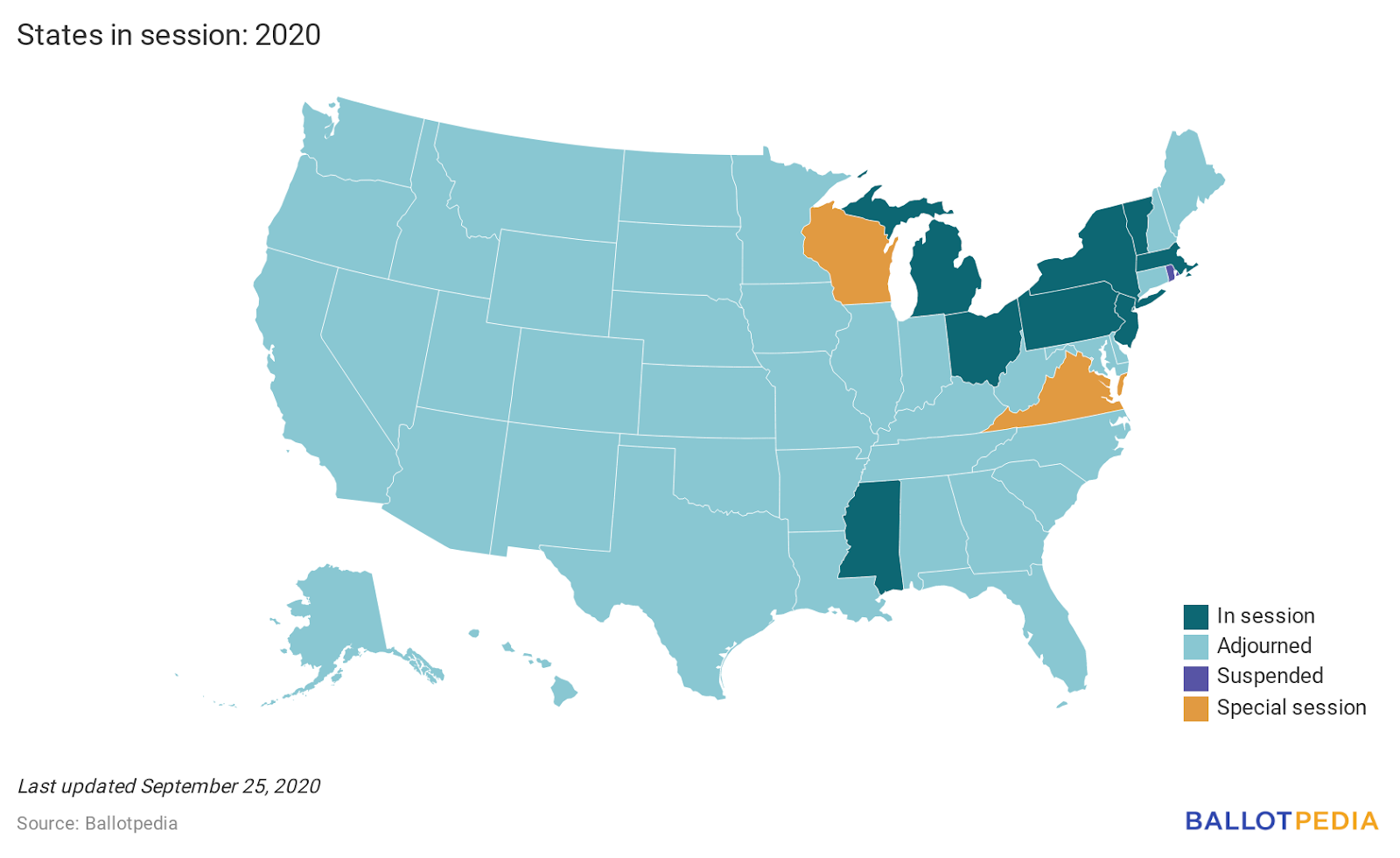|
|
|
|
|
In this week's State and Local Tap, we review ballot measures for 2020, discuss school reopenings and state travel restrictions, update you on special elections, and more.
|
State Politics: The Week in Review
Ballot Measures Update
- Unless courts remove other measures from the ballot, the 2020 statewide measures are finalized. Voters in 32 states will decide 120 statewide ballot measures on Nov. 3.
- Notable topics addressed by Nov. 3 measures include:
- Elections policy: Eighteen measures in 14 states concern election policy, including campaign finance, election dates, election systems, redistricting, suffrage, and term limits.
- Taxes: Voters in 12 states will vote on 19 ballot measures addressing tax-related policies.
- Marijuana and drug policy: Four states will vote on recreational marijuana legalization initiatives, and two states will vote on medical marijuana initiatives. Oregon could also become the first state to establish a program for legal psilocybin mushroom use and decriminalize all drugs if voters approve Measure 109 and Measure 110.
- Including the eight pre-November election dates, a total of 128 statewide ballot measures were certified for the 2020 ballot in 34 states.
- Forty-three of the certified measures are citizen-initiated measures. Eighty are legislative referrals. One is an automatic constitutional revision commission question. Four are advisory measures in Washington.
 |
Monday, September 21
2020 ballot measure signature petition costs are at highest level in a decade
- This year ballot initiative and veto referendum sponsors had to spend an average of $2.1 million to qualify a measure for the ballot—over twice the average since at least 2010. From 2010 to 2018, the average cost per signature was $4.70. In 2020, the number was $8.09 - an increase of 72%.
- Twenty-six states have a process for statewide citizen-initiated measures requiring anywhere from tens of thousands to hundreds of thousands of signatures to qualify for the ballot, depending on the state. Generally, campaigns hire companies to collect signatures.
- A total of 43 citizen-initiated measures (39 ballot initiatives and four veto referendums) were certified for 2020 ballots in 16 states. Three were on the ballot for pre-November elections, and 40 are on the Nov. 3 ballot. Sponsors used volunteer signature drives for three of the 43 measures. Paid signature gatherers were hired for the remaining 40.
- Initiative sponsors spent $85.82 million to collect the 11,000,395 valid signatures required to qualify the 41 measures with signature cost data available for the ballot. Data was not available for two measures—one in Mississippi and one in Oklahoma.
- By comparison, about $76.6 million was spent on the 68 citizen-initiated measures in 2018, and about $78.12 million was spent on those in 2016.
Tuesday, September 22
Schools in Vermont to reopen further, inter-scholastic competitions allowed
- Vermont Education Secretary Dan French announced schools will advance to step 3 of reopening, which allows for inter-scholastic competitions, starting Sept. 26. Step 3 also permits schools to use common areas like gyms and small groups of students.
- In March and April, 48 states canceled in-person instruction for the remainder of the 2019-2020 academic year. Those states accounted for 99.4% of the nation's 50.6 million public school students. Montana and Wyoming did not require cancellation of in-person instruction for the year. Montana schools were allowed to reopen on May 7 and Wyoming schools were allowed to reopen on May 15.
- The current status of school reopenings is as follows: Washington, D.C., has a district-ordered school closure, five states have a state-ordered regional school closure, two states are open for hybrid or remote instruction only, four states have state-ordered in-person instruction, and 39 states have reopenings that vary by school or district.
Six states modify locations affected by interstate travel restrictions
- On Sept. 22, Govs. Ned Lamont (D-Conn.), Phil Murphy (D-N.J.), and Andrew Cuomo (D-N.Y.) announced that Arizona, Minnesota, Nevada, Rhode Island, and Wyoming had been added to the tristate quarantine list, which includes 33 states plus Guam and Puerto Rico. Travelers from states or territories on the list are required to self-quarantine for 14 days upon arrival in Connecticut, New Jersey, or New York.
- On Sept. 23, Gov. Janet Mills (D) announced that Massachusetts travelers entering Maine would no longer be required to test negative or quarantine for 14 days. Other exempt states include New Hampshire, Vermont, Connecticut, New Jersey, New York, and Massachusetts. Travelers from all other states must present a negative COVID-19 test or self-quarantine for 14 days upon arrival in Maine.
- On Sept. 23, Gov. Michelle Lujan Grisham (D) added Colorado, Oregon, and Rhode Island to the list of high-risk states. Travelers from high-risk states must self-quarantine for 14 days upon arrival in New Mexico. Michigan and Hawaii were moved from high-risk to low-risk, exempting travelers from those states from the quarantine requirement.
- On Sept. 19, the Massachusetts Department of Public Health removed Wyoming from its list of low-risk states. Travelers from Wyoming must self-quarantine for 14 days upon arrival in Massachusetts.
Wednesday, September 23
Missouri, Virginia governors test positive for COVID-19
- On September 23, Missouri Gov. Mike Parson (R) announced he and first lady Teresa Parson had tested positive for coronavirus. The governor was tested after the first lady experienced mild symptoms.
- On September 25, Virginia Gov. Ralph Northam (D) announced that he and first lady Pamela Northam had tested positive for coronavirus. Northam said he was not experiencing any symptoms.
- Parson and Northam are the second and third governors to test positive for coronavirus, respectively. On July 15, Oklahoma Gov. Kevin Stitt announced that he tested positive for the virus.
- On September 21, Illinois state Rep. Sam Yingling (D), who represents District 62, announced on Sept. 21 he had tested positive for coronavirus.
- On September 22, Fred Hawkins (R), a candidate for Florida’s House of Representatives District 42, announced he had tested positive for coronavirus.
Thursday, September 24
Federal appeals court reinstates South Carolina’s witness requirement for absentee ballots
- Thirty-eight states have made changes to their general election procedures. This includes changes to ballot return deadlines, processes for requesting or receiving absentee or mail-in ballots, and ways voters can take to correct errors in their returned ballot (known as ballot curing). We tracked two state-level changes to election procedures this week:
- A three-judge panel of the U.S. Court of Appeals for the Fourth Circuit voted 2-1 on September 24 to stay a lower court decision suspending South Carolina's witness requirement for absentee/mail-in ballots in the general election. As a result, the witness requirement was reinstated.
- Judge William M. Conley of the U.S. District Court for the Western District of Wisconsin issued an order September 21 extending the absentee/mail-in ballot receipt deadline to November 9 for ballots postmarked on or before Election Day. Conley immediately stayed his ruling, giving the defendants seven days to file an emergency appeal.
Friday, September 25
No states made changes to orders requiring use of masks, face coverings
- No states issued new statewide mask orders or lifted existing face-covering restrictions between Sept. 18 and 25. The most recent state to issue a statewide public mask order was Mississippi on Aug. 5.
- Thirty-four states have statewide orders requiring individuals to wear masks in indoor or outdoor public spaces. All 24 states with a Democratic governor have statewide mask orders, while 10 out of 26 Republican states require face coverings.
Florida governor announces state moves to Phase 3 of reopening; bars and restaurants can operate at full capacity
- Gov. Ron DeSantis (R) announced on Friday, September 25, that Florida would enter Phase 3 of reopening effective immediately, allowing bars and restaurants to operate at full capacity. The order overrides local ordinances, unless cities can justify bar or restaurant closures on health or economic grounds.
- Bars in Florida were prohibited from selling alcohol on June 26 by the Department of Business and Professional Regulation (DBPR) following a spike in coronavirus cases. Bars were allowed to reopen at 50% capacity on September 14, though certain counties, such as Miami-Dade and Palm Beach kept them closed.
|
Special Elections
- Fifty-eight state legislative special elections have been scheduled in 26 states so far this year, with 37 seats having taken place already. Heading into those races, Democrats had previously controlled 14 of the seats, while Republicans previously controlled 23. One seat flipped from Democratic control to Republican control, and six seats flipped from Republican control to Democratic control.
- In special elections between 2011 and 2019, one party (either Republicans or Democrats) saw an average net gain of four seats nationally each year.
- An average of 56 seats were filled through special elections in each of the past five even years (2010: 30, 2012: 46, 2014: 40, 2016: 66, 2018: 99).
- An average of 88 seats were filled through special elections in each of the past five odd years (2011: 94, 2013: 84, 2015: 88, 2017: 98, 2019: 77).
- Upcoming special elections include:
|
State Politics: What's On Tap Next Week
Tuesday, September 29
Voters to decide special election in Texas State Senate district
- Five Republicans and one Democrat—Craig Carter (R), Andy Hopper (R), Shelley Luther (R), Jacob Minter (D), Drew Springer (R), and Christopher Watts (R)—are running in a special election in Texas State Senate District 30 on September 29. The candidates have highlighted property tax cuts, health care, and other issues in their platforms.
- The winner will succeed Pat Fallon (R) for the remainder of his term, which expires in 2023. Fallon submitted his letter of resignation on August 22, effective January 4, 2021, after he was nominated to run in the general election for Texas' 4th Congressional District.
- Early voting in this election began on September 14. If no candidate earns more than 50% of the vote, the top two finishers will advance to a runoff election.
|

|
States in Session

Eight states—Massachusetts, Michigan, Mississippi, New Jersey, New York, Ohio, Pennsylvania, and Vermont—are in regular session.

|

|
Local Politics: The Week in Review
|
 |
|
Ballotpedia depends on the support of our readers.
The Lucy Burns Institute, publisher of Ballotpedia, is a 501(c)(3) nonprofit organization. All donations are tax deductible to the extent of the law. Donations to the Lucy Burns Institute or Ballotpedia do not support any candidates or campaigns.
|
|
|
|
|